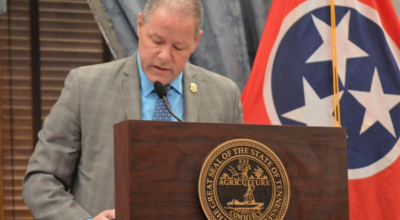
Because the health department has failed to identify or diagnose the contagious element of what is commonly called Covid-19, or CV-19, officials across the state have acted with violence and courage to suppress the lives of the people to keep them virus free.
By David Tulis / NoogaRadio 92.7 FM
The thunderclap of the disaster hit April 2 with Gov. Lee’s pretended order to halt all commerce and travel, and it reverberated for weeks into the lives of families, enterprises, shops, factories and offices, bringing billions of dollars of losses in Tennessee and putting hundreds of thousands of people out of work, with official numbers setting records.
The disaster decrees violate the constitution in several ways, with the locomotive violation — the key first violation — pulling behind it boxcars of cargo, namely other abuses of the people as one abuse necessitates other wrongs.
The health law is openly ignored, starting with Gov. Bill Lee and going down the food chain to include Dr. Lisa Piercey, his health commissioner, and county mayor Jim Coppinger and his health department administrator Becky Barnes.
‘Shutdown,’ ‘lockdown’ absolutely forbidden
These officials also ignore key provisions of the emergency law that is the basis of their effort to slow the spread of CV-19, which remains unidentified and a variant of the flu.
The legislature in Tenn. Code Ann. § Title 58, chapter 2, on emergencies, is concerned about acts that “threaten the life, health, and safety of its people; damage and destroy property; disrupt services and everyday business and recreational activities; and impede economic growth and development.”
The assembly says three conditions make such acts and events more dangerous: “[T]his vulnerability is exacerbated by the growth in the state’s population, in the elderly population, in the number of seasonal vacationers, and in the number of persons with special needs.”
The state of Tennessee in general assembly frets over “natural, technological, terrorist acts, and manmade disasters.”
In view are phenomenon such as earthquakes, wildfires and floods, as well as technological (a hack shuts down the power grid, or causes a water treatment plant to fail).
The emergency chapter “fulfills a compelling state interest” in the protection of the people.
The legislature founded TEMA “to deal with, reduce vulnerability to, and recover from such emergencies and disasters; to provide for the common defense and to protect the public peace, health, and safety; and to preserve the lives and property of the people.” Tenn. Code Ann. § 58-2-103.
TEMA exists to help maintain the life of buying and selling, that of service, repair, consultation, production, removal, delivery, medicine, refueling and refilling, nourishment and information — all those activities that were part of Gov. Lee’s “essential” and “non-essential” list of business.
No official anywhere has authority over the general population — no official. That power does not exist at law, and is exercised only by despots who reject their oaths and tread upon the rights of the people.
Here’s the law in full —

Tenn. Code Ann. § 58-2-102
(a) The general assembly finds and declares that the state is vulnerable to a wide range of emergencies, including natural, technological, terrorist acts, and manmade disasters, all of which threaten the life, health, and safety of its people; damage and destroy property; disrupt services and everyday business and recreational activities; and impede economic growth and development. The general assembly further finds that this vulnerability is exacerbated by the growth in the state’s population, in the elderly population, in the number of seasonal vacationers, and in the number of persons with special needs. This growth has greatly complicated the state’s ability to coordinate its emergency management resources and activities.
(b) It is the intent of the general assembly to reduce the vulnerability of the people and property of this state; to prepare for efficient evacuation or shelter-in-place of threatened or affected persons; to provide for the rapid and orderly provision of relief to persons and for the restoration of services and property; and to provide for the coordination of activities relating to emergency preparedness, response, recovery, and mitigation among and between agencies and officials of this state, with similar agencies and officials of other states, with local and federal governments, with interstate organizations, and with the private sector.
(c) It is further the intent of the general assembly to promote the state’s emergency preparedness, response, recovery, and mitigation capabilities through enhanced coordination, long-term planning, and adequate funding. State policy for responding to disasters is to support local emergency response efforts. In the case of a major or catastrophic disaster, however, the needs of residents and communities will likely be greater than local resources. In these situations, the state must be capable of providing effective, coordinated, and timely support to communities and the public. Therefore, the general assembly hereby determines and declares that this chapter fulfills a compelling state interest.
Tenn. Code Ann. § 58-2-102
Degringolade

